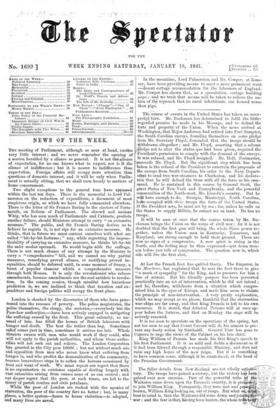London is shocked by the discoveries of those who have
pene- trated into the recesses of poverty. The police magistrates, the police themselves, the clergy, the societies,—everybody but the Poor-law author4ies,—have been actively engaged in mitigating the suffering caused by the frost. This great calamity, so un- usual of late, has filled the homes of British labourers with hunger and death. The best die rather than beg. Sometimes relief comes just in time, sometimes it arrives too late. Whole districts swarm with men who would work if they could, who will not apply to the parish authorities, and whom these autho- rities will not seek out and relieve. The London Corporation has granted to the City poor 10001.; but not without much ado Mid opposition from men who .never knew what suffering from hunger is, and who predict the demoralization of the community, because benevolence steps in to soften the horrors occasioned by frost and want of work. We must repeat our regret that there is no organization in existence capable of dealing largely with vast calamities arising from causes none of us can control ; and our deeper regret that the poor, at such times, are left to the mercy of parish routine 'end civic petulance. While the poor; of London are racked with the agonies of starvation, the poor of the country fare no better ; but, in' many places, a better system—house to house visitation—is adopted, and many lives are saved
In the meantime, Lord Palmerston and Mr. Cowper, at Rom- sey, have been.providing,means to meet a more permanent want —decent cottage accommodation for the labourers of England. Mr. Cowper has shown that, as a speculation, cottage building pays ; and we trust that means will be taken to relieve the na- tion of the reproach that its rural inhabitants are housed worse than pigs. ,


























